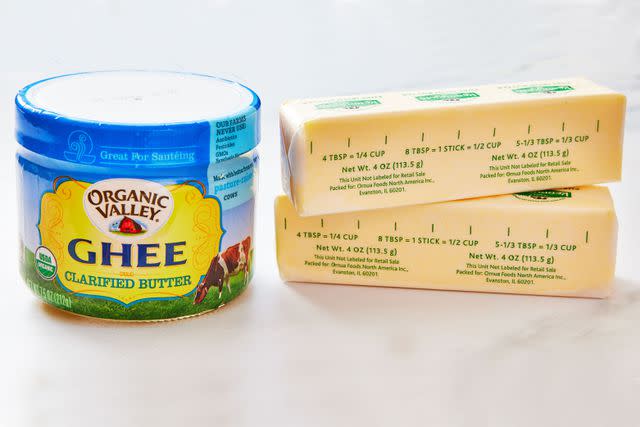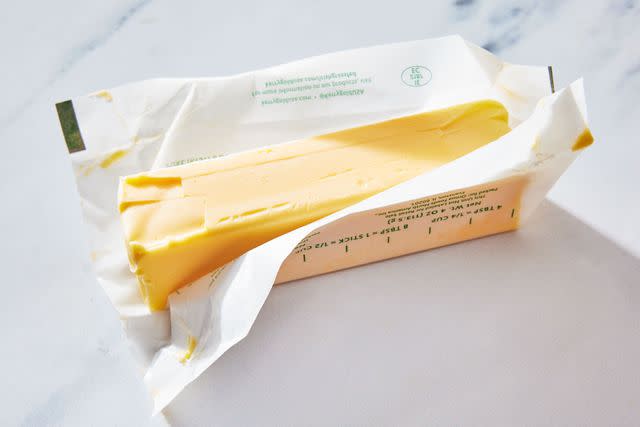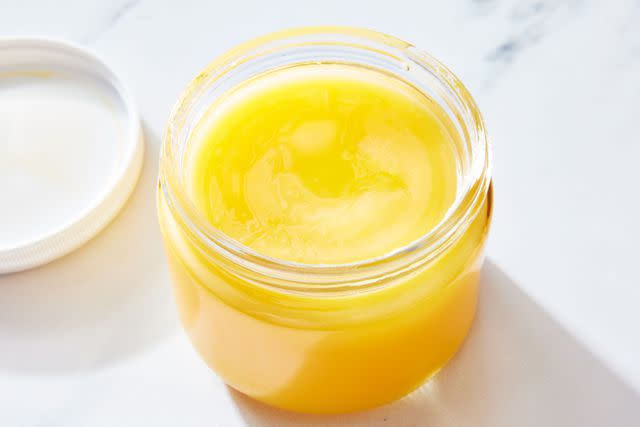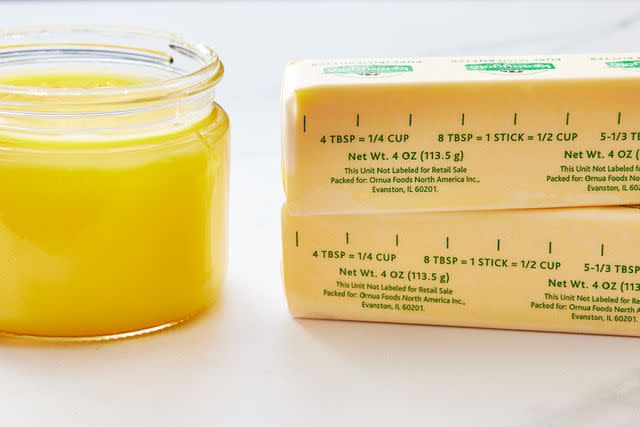Ghee vs. Butter: What's The Difference?

Everything is better with butter, clarified or not.
The best way to make a recipe even better is to add butter, but does that hold true for ghee, too?
When incorporated into recipes, butter adds flavor and can also be used when sautéing vegetables as an oil substitute. Of course, warm butter can also be smeared on a hot biscuit.

Caitlin Bensel
Ghee, sometimes touted as a healthier alternative to butter, is clarified butter and can be used in many of the same ways you would use butter or cooking oil.
Though similar, when it comes to ghee and butter, there are several differences including consistency, taste, and how it’s made. To fully understand the similarities and differences between ghee and butter, knowing how each product is made is important. Read on for a look at ghee vs. butter.

Caitlin Bensel
What Is Butter?
More than a great way to make a good recipe better, butter is a dairy product made by churning milk, or cream, into a semi-solid fat. Butter is a kitchen staple and comes in multiple forms, including salted, unsalted, whipped, grass-fed, Irish, and more.
Related: 11 Types of Butter—And How To Use Them

Caitlin Bensel
What Is Ghee?
Ghee is a staple in Indian and the Middle Eastern cooking. It is clarified butter, which means that all the milk solids and water have been removed to leave just the butterfat. This happens when butter is heated and the liquid and milk separate from the fat. The milk portion solidifies and is skimmed away, and what remains is ghee, or clarified liquid fat. Ghee is cooked slightly longer than clarified butter normally is, resulting in a nuttier taste, similar to browned butter. It has a butter flavor but can be used similarly to oil for frying.
Differences Between Ghee And Butter
Even though ghee and butter are similar, they have several important differences:
Expiration: Butter can go bad–and it will, if it is not stored correctly. Because ghee doesn’t contain water, it’s a very shelf-stable product. Making sure your jar of ghee remains water-free (that means steam, too) is key to avoiding bacterial growth.
Cooking: Ghee has a much higher smoke point (more than 480 degrees Fahrenheit) than other cooking oils, including butter. This means that when cooking high heat recipes–think grilled cheese or any kind of fritter–ghee will cook hotter, longer before it starts to degrade.
Consistency: While butter is considered semi-solid, ghee has a smooth and soft consistency.
Taste: When it comes to taste, ghee and butter have similar profiles, though some describe the taste of ghee as a richer version of butter.
Storage: Ghee can last up to six months in the refrigerator and a year in the freezer. Since it doesn’t contain water, it can be stored right on your countertop or in your pantry for up to one month. Refrigerating does extend its shelf life. If the ghee has a rancid odor, discoloration, off taste, textural changes (no longer smooth and creamy), or mold, it’s no longer good and should be thrown away. Butter can be stored in the refrigerator for up to three months and in the freezer for four months. It goes bad more quickly at room temperature but can be stored in an airtight butter crock for one or two days.
Uses: Ghee’s nutty flavor makes it a good option for making flavored butters, dipping seafood, sauteing or roasting vegetables, or drizzling over bread or popcorn. Since it has a higher smoke point, it can be used for frying. Butter is good for baking, making sauces, spreading on bread, topping vegetables, or drizzling over popcorn.

Caitlin Bensel
Is Ghee Healthier Than Butter?
While ghee is made from butter, some may argue that it is a healthier alternative to butter. But the nutritional values of the two are very similar. Both ghee and butter derive almost 100% of the calories from fat, with ghee containing slightly more than butter. There is no scientific evidence to support that one is healthier than the other. Because the milk solids and casein are removed during the process to make ghee, individuals who are lactose intolerant may be able to eat it.
Frequently Asked Questions
Who should not eat ghee?
While individuals with lactose intolerance may be able to eat ghee, those with dairy allergies should not. Ghee does contain low levels of lactose and casein, which is a milk protein. Those watching cholesterol should also avoid ghee because it contains saturated fats, which can increase the risk for heart disease.
Can I substitute ghee for butter?
You can substitute ghee for butter in a recipe at a one-to-one ratio.
What is better, ghee or olive oil?
Olive oil contains heart-healthy monounsaturated and polyunsaturated fats. While ghee contains omega-3s, it is also higher in saturated fats. Ghee can be used for cooking at higher heat, and olive oil has a lower smoke point, making it good for salads and cooking at a lower temperature.
For more Southern Living news, make sure to sign up for our newsletter!
Read the original article on Southern Living.